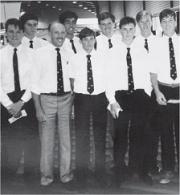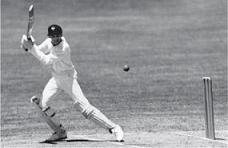Mr Cricket (5 page)

When it came time to put on my pads, all I could think about was how I was going to score my first run, not unlike later on when I made my Test debut. Accordingly, my first runs probably reflected my state of mind: after about 25 minutes I clipped one to square leg, called âwait', and the ball went straight through the fielder's legs. It wasn't exactly dominating or aggressive, but they were my first runs in A-grade and I'll take them.

I was always smaller than the other kids.
I held my place in the team and went on to have some good knocks. But the mindset of being defensive and trying to do little more than survive stayed with me. Meanwhile, I was always trying to suppress my envy of the big and strong players around me, especially Marto, who remains one of the most gifted batsmen I've ever seen. Batting with Damien at first-class level was great. But batting with him when I was a kid brought home the truth that I had a whole lot of work to do to get to where he was.
Marto had this almost ridiculous ability to toy with bowlers and hit the ball wherever he liked, whenever he liked. He was an awesome batsman. One particular Wanneroo innings comes to mind, when his placement and timing were unbelievable. There were a few people watching as Damien had already become a Test player. He was going through a fitness kick at the time, so he decided that instead of hitting boundaries, he would place the ball into gaps and run ones, twos and threes. He scored 75 off about 40 balls, while I became completely exhausted trying to keep up with his running between the wickets. He'd call as he chipped each ball. He'd hit one through cover and yell âTwo!' as he connected. The next ball he would push between midwicket and mid-on and call âThree!' as he stroked the ball. It was amazing and showed me up close just how good you had to be if you wanted to play for Australia.
It felt like there was a huge gap between us in terms of talent, skill and ability. It seemed as large as the distance between Pluto and Mercury. How could I ever do what he did? How could I dominate like that? It was a good wake-up call.
Given what I've been able to achieve since then, it's interesting to think back to those times at Wanneroo when I felt so out of my depth. I did well in A-grade but, because it always seemed to be a vigil, I rarely felt satisfied and often had the niggling thought that I should be scoring more quickly. If I batted the whole day I'd only be on about 80 or 90 runs. It was hardly exciting stuff.
Even when I made runs, I felt as though I was letting my teammates down because it took too long. My goal was to get the team into a good position and scoring 80 helped to do that. But if it took all day, it wasn't good enough. I was too worried about pleasing people and, in my mind, that overshadowed the fact that I was actually doing a job for my team. I was a harsh self-critic in those days and often thought the worst instead of looking at the positives. âI need to score faster, score more, what are the boys thinking, they're not happy with me, and so on.'

Playing in a semi-final in 1992.
My top score was 73.
START SLOW:
 Start every innings the same
Start every innings the same
 Play my game, watch the ball, push singles, allow balls to pass early, be positive, bat for a long time
Play my game, watch the ball, push singles, allow balls to pass early, be positive, bat for a long time
 If something extraordinary happens, get my mind back on to my job before taking strike
If something extraordinary happens, get my mind back on to my job before taking strike
 Assess the situation better when I have been fielding for a long time. The team needs someone to hang in there and grind for a while.
Assess the situation better when I have been fielding for a long time. The team needs someone to hang in there and grind for a while.
It wasn't until much later that I came to the incredibly important realisation that, in fact, I wasn't the only person around who had these types of thoughts. Even Marto, this aggressive, super-talented batsman who had left me awestruck as a teenager, had to deal with his personal demons. Damien was a victim of his own talent. Because he was so good, he has since told me, he felt a great expectation to perform above everyone else every time he batted. I had thought of him as invincible and believed there was no chance that he could harbour any doubts or fears.
I certainly learned a lot from him during his hard times, when he was almost dropped from the WA team and when he went through that long period of difficulty towards the end of his international career. I listened to him talk about cricket and his efforts and methods to stay confident. It really struck a chord with me.
It's one thing to accept you have fears. But it's another to actually do something about it. I've always been very competitive and never scared to do whatever work it took to keep progressing. But I also knew where my weaknesses lay. During a game against Queensland at the Gabba a few years back, the frustration of not being able to overcome those weaknesses really got to me and I decided to act on it in a way I hadn't previously.
Queensland was the benchmark for aggressive cricket throughout the 1990s. The pitch at the Gabba was always green and fast and they had a fantastic fast-bowling quartet of Andrew Bichel, Adam Dale, Scott Muller and Michael Kasprowicz. As the bowlers were trying to knock you over the fielders would be constantly at you, doing their best to make you feel inferior. I'd had a few years in the WA team by that stage, but I'd never handled pressure as well as I wanted and was very determined in this particular game to prove that I could compete with the hardest blokes in the Shield. My determination, however, was fruitless and I didn't do as well as I wanted. It was very disappointing because I thought I was ready to take on a team like that. I felt I had the skills to do it, but what was lacking was mental strength.
I thought about who was the most mentally tough cricketer out there. On the surface, at least, that person had to be the Australian captain, Steve Waugh. So, as soon as I was dismissed in the second innings, I got back to the dressing room, got changed, picked up a pen and pad and started writing to him. I wanted to ask Steve to explain how to address fear and build mental strength. I explained my experience at the Gabba and the reasons I believed I'd performed poorly and asked him if there was anything I could do to improve.
LETTER TO STEVE WAUGH
Steve Waugh,
I know you are a very busy man. But it would be hugely appreciated if you could put pen to paper to help me out with just a few words.
How do I become more âmentally tough'? What is mental toughness? Playing in a game recently at the Gabba, the Queensland bowlers were chirpy and bowling very tight. I really wanted to get through that tough situation. I went through my same routine each ball, had a clear focus and was readily accepting the pressure.
I'm very big on hard work and preparation. I am a tight player, quite technically correct and like to build up an innings. I'm patient early, watch the ball, work the singles and play straight. But Queensland seemed to really build the pressure up on me by cutting down my scoring options, bowling patiently, giving me hardly any balls to hit. They really chirped in my ear (which is really hard not to listen to). It got to the stage where I didn't know where my next run was coming from. I have scored runs before against Queensland and I approached my innings positively, but very patiently and relaxed.
I really wanted to do well and I wanted to be tough and enjoy the challenge, but deep down I had this fear of failure or doubt in my mind. How can I approach similar situations? What can I do to prepare myself and believe that I can do it and become a more mentally tough player?
I love the game of cricket and I love batting. There are many different situations one must contend with, some tougher than others. I wish I could handle the really tough situations better so as to improve as a player. I would get enormous satisfaction out of scoring a really tough hundred, with our backs against the wall to get our side into a good position and win the match.
Michael Hussey
However, as I wrote the letter, I realised that I was, in fact, confirming to myself exactly what I needed to do. I started to see that I did give in to myself; I did give in to the fielders' chirping in my ear; and that what I had to do was be more effective in putting them out of my mind and be more able to concentrate on my job â which was nothing more than to play the next ball. The Queenslanders were very good at making you feel as though you had to change your way of playing and, when you were scoring slowly, they were very good at making you feel like you were letting your team down. I knew, as I was writing, that I needed to focus more strongly on the fact that what I was doing was right for the situation my team was in and nothing should get in the way of that. I ended up getting cold feet and didn't send the letter. But simply writing it and wondering what advice Steve would have given me helped a great deal.
